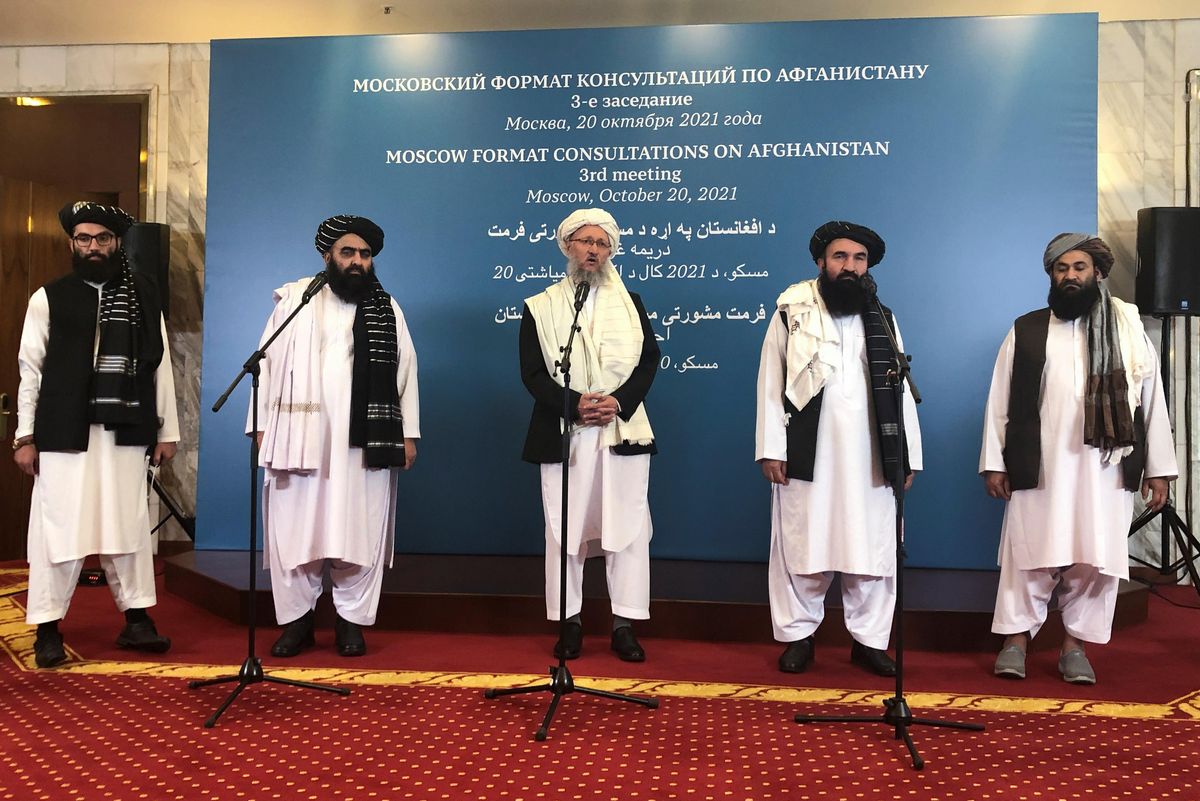Back in August, when the Taliban took over, we asked whether anyone in the international community would recognize them. Now it looks like things are heading that way.
This week, the Kremlin hosted a summit with the Taliban that was attended by China, India and Pakistan, as well as all five Central Asian Republics.
The domestically-focused US, however, wasn't there. The US continues to maintain that the Taliban can't be trusted. But does it matter? In 2021 does a Taliban-led government even need American recognition to function and thrive?
Background: who's willing to recognize the Taliban?
Regional powers like Russia and China have suggested they'll recognize the Taliban, provided that the group safeguards their respective interests.
A pragmatic and increasingly ambitious China wants two things: access to Afghanistan's mineral wealth, and an opportunity to build bridges and roads across the country as part of its vision to crisscross Asia with Chinese infrastructure. Russia wants to ensure the Taliban don't give safe haven to militants targeting Russia and the Muslim-majority former Soviet republics in Central Asia.
The isolated Taliban will surely want Beijing's infrastructure investment – and the job creation that goes with it. And while it's unclear how much economic influence Russia has on the ground, Moscow has emerged as the key power-broker in recent months, suggesting it does have diplomatic clout as it tries to maintain good relations with the new government in Kabul.
Moreover, Pakistan has long enjoyed close ties with the Taliban, while Turkey has been cozying up to the Taliban as part of its effort to expand its influence in Muslim-majority countries, and stop an influx of Afghan refugees arriving via Iran. India – worried that a Taliban-controlled Afghanistan would help its arch-nemesis Pakistan launch attacks against it – wants to maintain solid relations with Kabul as well.
But… does the Taliban-led government even need the US' endorsement to function?
To a certain degree, yes. The US dominates the global financial system, with some two-thirds of international trade and lending done in US dollars. It also has sufficient control over the SWIFT system, which allows financial institutions and banks to safely transfer money around the globe. Indeed, blocking countries from this network can be extremely painful (just ask the Iranians).
The US has also used its clout at international organizations like the IMF and the World Bank to compel these institutions to suspend projects and payments to Afghanistan in recent months. Additionally, there is still some uncertainty about how US sanctions might apply to a Taliban-run Afghanistan. Anyone caught doing business with Taliban-administered banks might face the risk of sanctions, as is the case with Iran. This is hardly a solid PR ploy to attract outside investment.
What's more, the bulk of Afghanistan's foreign reserves – more than $9 billion – are tied up in US banks, and Washington has ensured that the Taliban only have access to a meager 0.1-0.2 percent of this stash. Even before the takeover, the country's economy was slated to shrink because of the pandemic. Now, a depreciating currency as a result of a cash crunch and falling imports is making matters worse: the IMF recently warned that the state's GDP could shrink by 30 percent this year.
Still, the Taliban can get support and aid from other places. Indeed, the Islamist group could turn to regional development banks for disbursements like the Beijing-led Asian Infrastructure Investment Bank, which the US is not a member of, as well as the Asian Development Bank that already has extensive operations in Afghanistan.
And if all else fails, there's always opium. The Taliban have made a mint from opium production in recent years, with the group accounting for around 85 percent of the global supply. Illicit mining activities have also proven to be a cash-cow, as has the side hustle of selling US-made weapons and vehicles left behind amid the chaotic American withdrawal.
Looking ahead. For all the banter about America being in decline, Uncle Sam still pulls (most of) the levers of power in the global financial system. The Taliban can find alternative sources of support and income – but it certainly won't be easy.


















